General Information
India has made considerable progress in broiler production in the last two decades. High quality chicks, equipment, vaccines and medicines are available. With an annual output of 41.06 billion eggs and 1000 million broilers, India ranks fourth largest producer of eggs and fifth largest producer of poultry broiler in the world. The broiler production has also sky rocketed at an annual growth rate of about 15 percent at present. Broiler farming has been given considerable importance in the national policy and has a good scope for further development in the years to come.
Advantages of Chicken farming
- Initial investment is a little lower than layer farming
- Rearing period is 6-7 weeks only
- More number of flocks can be taken in the same shed
- Broilers have high feed conversion efficiency i.e. least amount of feed is required for unit body weight gain in comparison to other livestock
- Faster return from the investment
- Demand for poultry meat is more compared to sheep/Goat meat
Indigenous Breeds
The Indian birds are mostly non-descript and are of very little value as layers. They have several local breed names such as Tenis, Naked Neck, Punjab, Brown, Ghagus, Lolab, Kashmir Faberella, Tilri, Busra, Telllicherry, Danki, Nicorai and Kalahasti. There are only 4 pure breeds Kadaknath and the Busra. The last occurs in western India. A large number of flocks of different size, shapes and colours, and for the most part resembling the jungle fowls, are found all over India. They vary in appearance according to the locality in which they have been bred. These with Chittagong, Aseel, Langshan or Brahma blood in them are bigger in size and better in meat quality than the common flows.
The poultry diseases caused by:
- Viruses (Newcastle Disease, Gumboro, Avian Influenza, Duck plague)
- Bacteria (Fowl Cholera, Salmonella, Mycoplasma, E. Coli, Rimerella anatipestifer
- Fungi ( Aspargilosis, Mould, Mycotoxins)
- Protozoa and Parasites (Coccidiosis, Intestinal Worms, lice & mites)
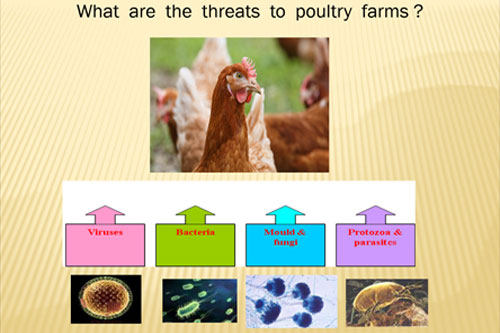
Prevention and control of poultry diseases
- Implementing Bio-security
- Vaccination program
- Disinfection
- Schedules For Cleaning
- Give your birds daily check-ups
- Feed your birds quality feed
- Let birds free range around your yard
- Try not to add new chickens to the flock
Remember! – Prevention is always cheaper than cure
Bio-security Plan
Bio-security plan is a set of practices designed to prevent the entry and spread of infectious diseases into and from poultry farm. Bio-security requires the adoption of a set of attitudes and behaviors by people, to reduce risk in all activities involving poultry production and marketing

Bio-security plan should focus on
Preventing disease agents from entering the farm By keeping potentially infected animals and contaminated objects away from healthy poultry. This requires formation of barriers Physical and/or Conceptual.
Prerequisite
A) Good bird management ensuring the good health and maintenance of poultry on farm
Provide adequate feed,water, temperature, airflow
Keep records of the flock :
- source and number of birds being placed in the farm
- how many birds died or culled each day (in number and %)
- daily feed consumption (in tot and in grs/bird)
- daily water consumption (in Liters)
- vaccinations, medications, vitamins
B) Screened walls and windows
Prevent contact of poultry inside the chicken house with wild and domestic animals and birds from the outside
C) Strict procedures-for farm entry
- All workers or visitors must wash hands and feet with soap before entering the chicken house
- All workers or visitors must change or cover clothes and footwear before entering the chicken house (wear farm’s clothes)
- All workers or visitors must clean and disinfect footwear between sheds by using a footbath or change footwear
- Only essential visitors allowed on farm such as : veterinarian and service man.
- never allowed in: chicken/duck & eggs dealers
- Visitors allowed in under strict conditions
- wash, change of cloths, restricted movement, etc)
- Prevent contact of poultry inside the chicken house with people from the outside that might carry disease on their hands, cloth or footwear
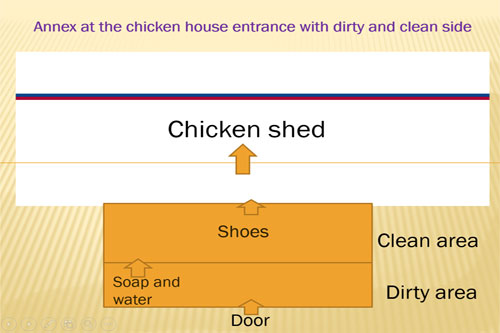
Vaccinate your chickens
Vaccination is only necessary if your chickens have suffered from something in the past or have been in multiple flocks. You can also buy vaccinated chicks from a breeder or farm store.
Disinfection
Disinfection is the least reliable step of bio-security, depends on the quality of cleaning, water hardness, etc. might kill any remaining contamination.
To achieve effective disinfection you must ensure:
- removal of all dirt during the cleaning process
- usage of only approved disinfectant
- preparation of disinfectant solution in correct concentration
- application of disinfectant in the correct volume to ensure effective contact time and to cover the entire surface
- preparation and application of disinfectant in a safe manner
Make a schedule for cleaning
Every month, you should remove bedding and nesting straw/shavings and replace with new, fresh material. Every 6 months, you should bleach and clean their feeders, waterers, and entire coop. Once again, remove the old shavings and replace with clean shavings. Cleaning the bedding material prevents disease-causing stuff , such as mold, parasites, and ammonia from building up and biting you AND your birds, It will prevent fungus in their feet and parasitic infections. a bed placed in a location where it gets sun will also prevent bacteria reproduction, It makes the coop feel fresher, too !
Give your birds daily check-ups
Because birds are flight animals, they will often hide their symptoms of illness until it is too late. So, even if your birds DO get sick, you can still catch it before time runs out! Signs to look for include: Lethargic behavior Suspicious or abnormal stools, including diarrhea, all white stool (should be brown with white top), blood in stool, or worms Sneezing Huge drop in pecking order Wounds Take your bird to the vet if you see any of these.
Feed your birds quality feed
Good feed should contain about 20% protein, amino acids for growth, and sufficient but not excessive fats and carbohydrates.
Let birds free range around your yard
It reduces stress, which will keep them more healthy overall. They will also eat weeds, grass, worms, and other delicious things they find in the yard, which will not only help your lawn, but will also help out their digestive system, making them healthier
Try not to add new chickens to the flock
If you buy or receive chickens from a person they may carry a disease. To prevent this it is best that you make sure that the chicken doesn’t carry a disease or do not add them to the flock and just raise your own chicks.


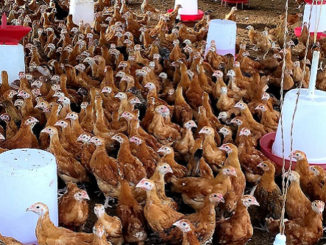
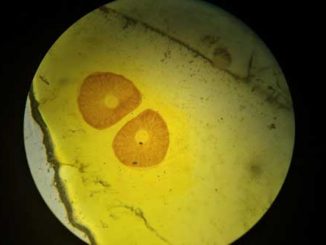
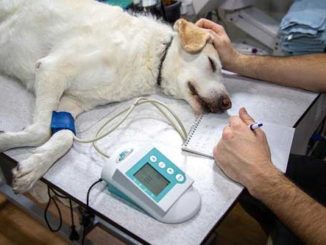

Be the first to comment